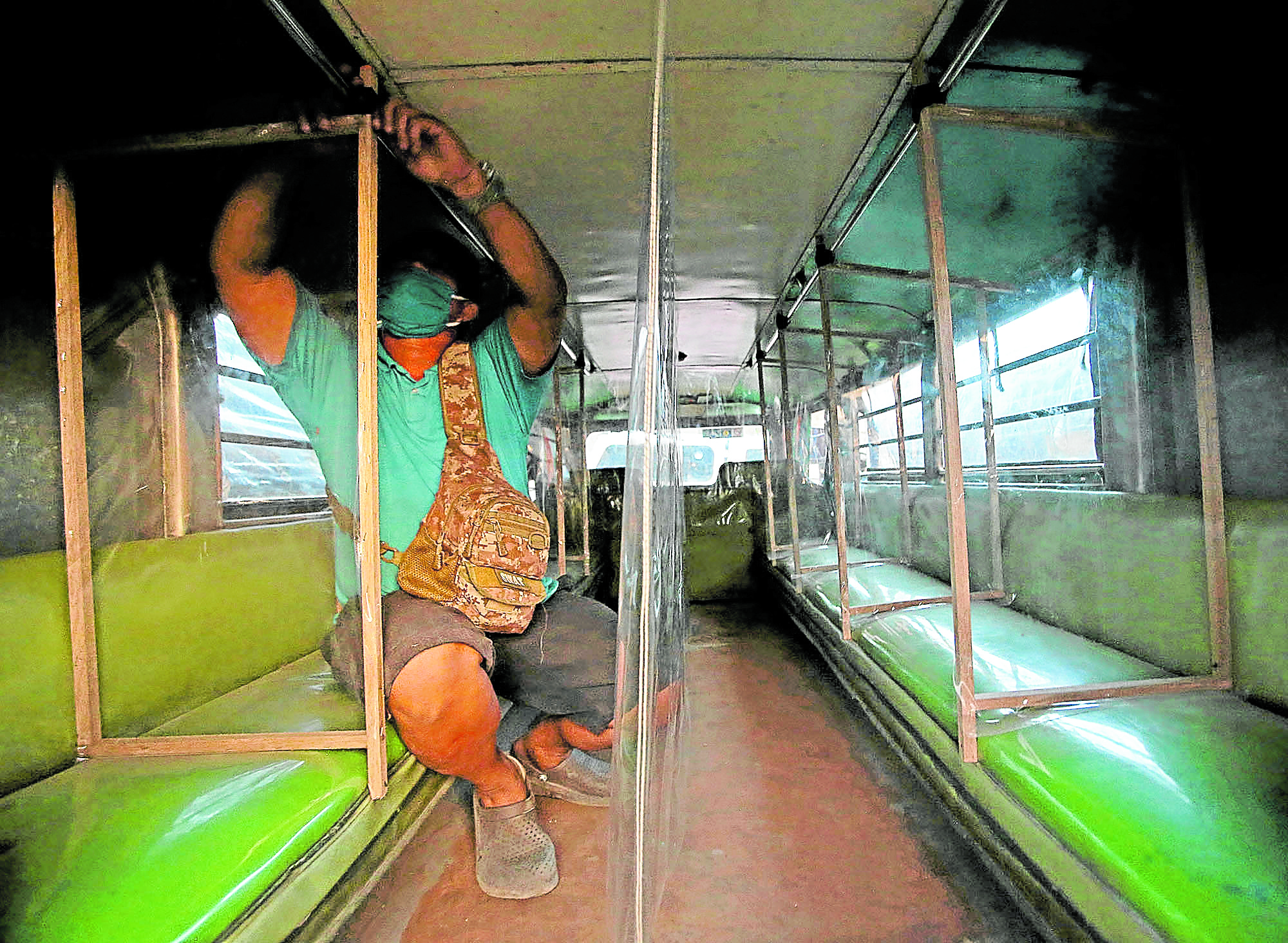Out-of-work driver preps jeepneys for social distancing
MANILA, Philippines — He is more accustomed to taking the wheel than using the hammer. But the past three months had left Edwin Quilaton, a 49-year-old jeepney driver in Parañaque City, with nothing to do, his vehicle idled by the ban on public transportation under the community quarantine imposed on Metro Manila to stem the spread of COVID-19.
Because of the jeepney’s face-to-face seating configuration, a setup that makes it difficult for passengers to maintain physical distancing, the supposed “King of the Road” was demoted to the last rung in the government’s “hierarchy of transport.”
Worried that the vehicle’s limitation would keep it off the road while the pandemic persists, Quilaton dusted off his carpentry skills and designed wood-and-plastic partitions fitted to a typical jeepney’s interior, separating the passengers by a meter. As an additional barrier, a plastic curtain is installed in the middle of the aisle.

KEEPING PASSENGERS APART Jeepney driver Edwin Quilaton installs wood and plastic partitions to allow for some physical distancing between passengers in the public vehicle once hailed as the King of the Road. —RICHARD A. REYES
‘Proud of my work’
“This is my own handiwork,” he told the Inquirer with a hint of pride. “The key here is the plastic. Even if passengers cough or sneeze inside the vehicle, the droplets would be contained instead of scattering over a distance.”
He could double each protective layer “just to make sure none of us ever gets sick when we get back on the road again,” he added.
As of Friday, Quilaton had rendered his service to a number of fellow drivers — practically free of charge. He has done about 20 jeepneys “except mine.” “I save the best for last,” he said.
Article continues after this advertisementHe said the needed materials would cost around P1,000 per jeepney, all shouldered by the owner.
Article continues after this advertisementAsked why it’s alright if he doesn’t get paid for his work, he said: “Sometimes I just try to understand. All of us are barely surviving this pandemic; life is that hard right now. Some operators are afraid jeepneys might be banned for good, so why bother spending for the partitions?”
“But I am proud of my work,” he said. “I look forward to the day when I can test it out. That’s ‘gawang Pinoy’ (proudly Filipino-made) for you, although it seems our government officials are not interested in our craftsmanship.”
Worried for son
Since migrating to the national capital from Cebu province 17 years ago, Quilaton has been practically living on the road, a breadwinner behind the wheel 12 hours a day, six days a week, plying the Nichols-Baclaran-MRT route.
It has not been easy living, he said, with no savings to speak of from his daily earnings of about P800. But this “honest work” has enabled him to send his eldest and only son to college.
“I slaved away for my son who in two years should be graduating [from a hotel and restaurant management course], “ Quilaton said. “I did my very best so that he’d never have to stop schooling even for a year. Unfortunately, I really can’t afford his tuition this year. He would have to skip his studies in order to find work and help [the family] get by.”
Quilaton is one of the 55,000 jeepney drivers in Metro Manila who have been affected by the transport ban since mid-March. Many of them have been reduced to mendicancy, going out in groups to beg for alms on the sidewalk, their plight making the news and amplified on social media.
Quilaton said he was one of the Parañaque residents rendered jobless by the lockdown but who hadyet to receive cash aid from the national government. His family has since been depending on relief goods coming from City Hall and on small loans from relatives and friends.
Just thinking about the debts piling up makes him cry. “We don’t want to live on dole-outs. We know how to earn a living, so the government must let us do just that.’’
For more news about the novel coronavirus click here.
What you need to know about Coronavirus.
For more information on COVID-19, call the DOH Hotline: (02) 86517800 local 1149/1150.
The Inquirer Foundation supports our healthcare frontliners and is still accepting cash donations to be deposited at Banco de Oro (BDO) current account #007960018860 or donate through PayMaya using this link.